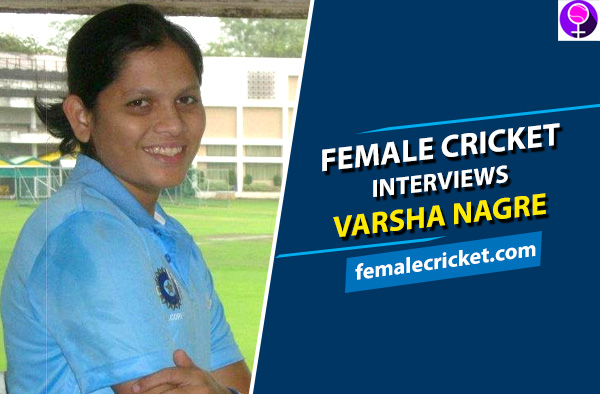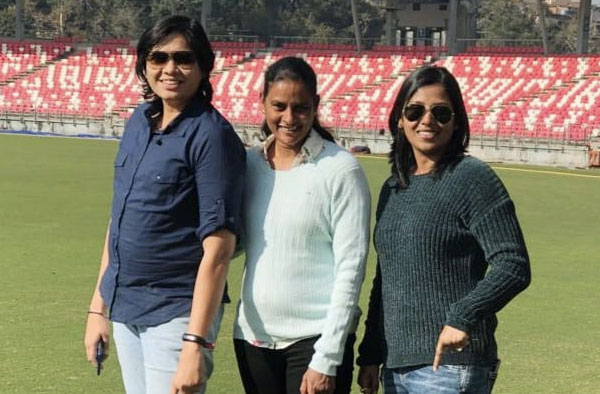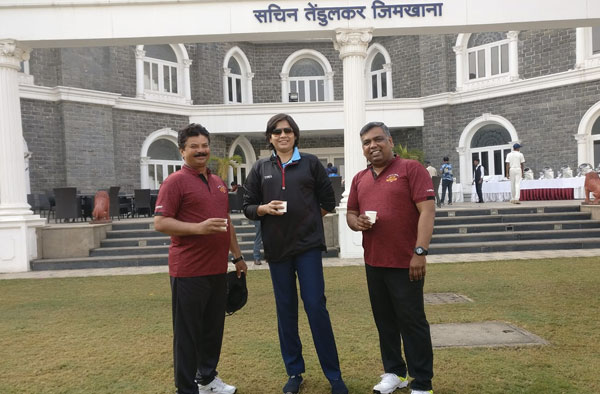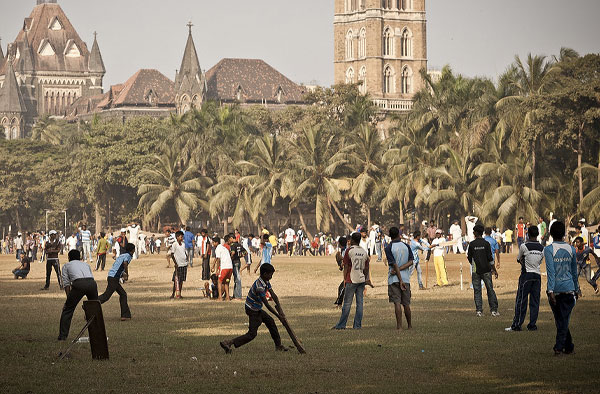A player turned scorer turned umpire turned match referee, Varsha Nagre’s tryst with cricket is unequivocally unmatched. Clearing the scoring and umpiring exams with ease, and standing fifth in the Level 2 examination for match referees, the 34-year old, has made a solid mark in a male-dominated field. The eyes that looked upon her with doubt have now filled themselves with confidence as they see her walk out to the center for the toss. Nagre’s discipline and dedication are unparalleled and her love for the game unmatched. Female Cricket got in touch with this former Mumbai cricketer turned match referee, to know more about her and her rise as a professional match referee.

Excerpts from the Interview
1. With no cricket being played for over three months now, how are you keeping yourself busy in this lockdown?
Since March I am spending my mornings doing physical fitness. Then I read newspapers and watch the news. I am also catching up on movies that I missed watching. Apart from this, I have been reading the MCC laws. A few days back, a group of BCCI match officials from Mumbai started one activity which was led by Ganesh Iyer sir where we discussed few important topics which helped all match officials to improve their performance individually and enhance their knowledge. We used to get one topic a day in advance and the next day we used to discuss the same. Anil Dandekar from Mumbai who is umpiring at the highest level has helped us as well with his experiences. BCCI also started one quiz since last month for all match officials where they are forwarding some questions and we need to answer those in a given time.
2. You played cricket at the state level for Mumbai for quite some time. So when did you decide to get into scoring, umpiring, and match officiating?
I initially started scoring for pocket money. This was around the year 2006-07. I used to travel daily to Matunga for practice and sometimes to Kandivali. So for traveling and food I required money. In order to meet my requirements, I used to do the scoring on Sundays in some private matches (example: Doctor’s tournament).
The money earned would help me in paying my traveling and food expenses over the week. This is how it started. In 2008 I got to know about the MCA scoring exam. I appeared for the same and cleared it. In 2010 I got the opportunity to appear for the BCCI scoring exam which was held in Rajkot and I cleared that as well. 2011 onwards I started doing scoring in domestic matches. While doing scoring I realized that scoring job is a sedentary job and I have more energy which was not utilized.
In order to channelize my energy for the good, Vrinda and I decided to take up umpiring alongside. In 2013 we appeared for the umpiring exam and cleared it. Two years later, I appeared for the BCCI Level 1 umpiring exam and cleared it. I used to work for five days a week from October to May as a Physical Education Teacher in school and over the weekends I used to stand as an umpire in local matches. Then in 2018, I came to know about match referee exam as earlier only International players in women category allowed to appear for Match Referee exam but in 2017 BCCI changed that criteria and allowed domestic women players as well. I applied for the same in MCA. Luckily MCA forwarded my name to BCCI for the aforementioned exam, which was held in Bangalore in July.
I still remember the day 14th August 2018, it was 6.28 pm I received a call from MCA. Initially, I thought it’s for Kanga League posting but to my surprise, it was Ganesh sir who congratulated me for clearing the BCCI Match Referee exam. I started my journey as a match referee from October 2018.
3. What was your family’s reaction when you decided to hang boots as a cricketer? Did they support your dream of becoming a match official?
Honestly, when I decided to play leather ball cricket they said, “No.” My parents said it will be difficult for them to support me financially for cricket. But since I was very passionate about the game I started playing. During my initial days, I used to walk daily 9 km for my practice at Dadoji Konddev Stadium in Thane.
The very next season I started practicing under Coach Surekha Bhandare at Matunga Gymkhana and that is when I got to know about scoring. When I took up umpiring, my parents especially my mom asked me what I do exactly. I told her I stand as an umpire for six hours a day. She got angry with me and said that she would not support me.
She said, “You are working for a good school and earning enough money so don’t do all this.” But later I told her that I felt happier after doing umpiring/scoring for two days than teaching in school for five days. She took her time to understand this.
4. Being a BCCI Level 1 umpire, in 2016, you first stood as an umpire in a boys U-14 Giles Shield match. What was the reaction of the boys to see a female umpire?
It was not my first match as an umpire. But when I started in 2013/14 in the beginning it was difficult for players to accept that a girl is going to be an umpire in the match and she is going to give decisions. As we all know cricket umpiring is a male-dominated field but I am happy that their views changed in a couple of months after they started seeing Vrinda and me as umpires in most of the local matches. That is how they accepted.

5. To stand as an umpire for long hours, you need a lot of stamina. How do you keep yourself fit and alert?
As I played this game it helps me a lot to maintain my stamina throughout the day. When I used to do umpiring my daily target was walking 10,000 steps without fail.
6. Along with umpiring, you started your scoring journey during India’s ODI against New Zealand at Wankhede in 2017. How was your experience?
Before India vs New Zealand match, I officiated in many of the IPL games so that experience helped me a lot during the India-NZ ODI. I was clear about what was expected of me and how I need to deliver my best throughout the match.
7. In 2018 you graduated from being a scorer to match referee. How has the transformation been?
Honestly, I never dreamt of becoming a match referee. I was into umpiring completely and my focus was on umpiring only. I wanted to be a BCCI panel umpire. But after failing in the Level 1 refresher exam, there was just one thing going on in my mind; when I will get the next opportunity to appear for the exam. Meanwhile, I decided to keep my focus on umpiring and whenever an opportunity would come I will grab it with both hands.
Out of nowhere, in the month of July, the Match Referee exam was scheduled. I appeared and I cleared. Everything happened as a surprise. But I am happy now with my job profile as it includes a lot of on-field and off the field tasks and I am enjoying my role. I was fortunate that Javagal Srinath was our educator for our BCCI Match Referee exam. He explained to us what the game expects from us.
8. You made your match referee debut in the Under-19 women’s T20 match between Baroda and Chhattisgarh in Rajkot in October 2018. Tell us about that.
It was my debut match so there was a lot of excitement and at the same time nervousness too. As soon as I got to know about the match, I made a checklist and frequently checked whether all the boxes were ticked. A day before any match/tournament we need to conduct a pre-match/tournament meeting. Being my first meeting, I was nervous as it was in the back of my mind that the meeting is getting recorded and the recording of which will be shared with BCCI. Luckily meeting went well and I got some confidence from thereon. The next day when I went for my first toss as Match Referee, I was again a bit nervous. Once the toss was done, I went up to my designated place to do the remainder of my match work.
In a matter of few overs, a decision went up to the third umpire. In domestic matches, the match referee also fills as the third umpire. I was in business instantly. For a few seconds, I was left blank, but then I gathered my thoughts, watched the replay on the television screen, and gave the decision. It was as if somebody uplifted 100kg weight from my shoulders.

9. In the same month, you officiated in the Assam v Bihar U-16 Vijay Merchant boys’ game in Guwahati. How was that experience?
It was a special match for me as it was my first multi-day assignment. The umpires for the said match were former ICC Panel umpire Amish Saheba sir and Ranji trophy umpire Madangopal sir. The two gentlemen made me feel at ease. During the match, they were supportive and helpful.
10. What do you enjoy more; scoring, umpiring, or being a match referee?
Frankly speaking, if I am doing scoring I will enjoy scoring, if I am umpiring, I will enjoy umpiring, and the same applies for when I am a match referee. The best part of all the three roles is that I am completely involved in the game.
11. Since you have had an experience of scoring, umpiring, and being a match referee, can you tell us what the challenges are in each of the roles?
There is one common thing in all these three jobs and that is you require a lot of concentration.
Scoring – You have to record all the balls bowled in your score-sheet without missing even one. For that, you require immense focus and concentration. In addition, you have to acknowledge each and every signal from the umpires. At the same time, you have to take care of the scoreboard whether the right score is being displayed. You need to be on your toes all the time. The scorer is the first person who comes on the ground and is the last person to leave.
Umpiring – In umpiring along with focus and concentration, you need to be physically fit to stand in the sun for six hours. Initially, when I started doing umpiring I faced a lot of problems with respect to the change room.
If I am officiating on open grounds like Azad, Cross, or Oval maidan in Mumbai, changing my attire was a challenge. I found a solution. I used to go to McDonald’s outside CSMT station and changed there, while at the end of the day I usually went to Sterling cinema to change.
I used to feel awkward to use both these places without actually buying anything. Later I started ordering coffee/ ice cream so that nobody would object.

Match Referee – Few people address a match referee as a boss, but I don’t think so. For me, a match referee is like a caretaker, who is taking care of all the protocols. As a match referee, you meet new people and you have to just make sure before the start of any match/tournament all things need to be in ready position a day advance. Javagal sir told us during one of the seminars that a match referee’s main aim is to ensure that both teams and both umpires feel comfortable till the end of the match. If they are not comfortable, then as a match referee you fail.
A match referee has to take care of the things on the field as well as off the field. Before the match, we have to take care of all the arrangements and conduct a pre-match meeting. During the match, you have to double up as a third umpire. After the match, present the match report to the concerned authorities. Apart from these, every venue you will have a different set of challenges. You have to find a way to tackle them so that the match progresses smoothly.
12. To be a good match official you need immense concentration. How do you build your concentration levels?
Prior to becoming a match referee, I worked as a scorer and umpire. In both these jobs, high levels of concentration are required. Thankfully I don’t need to take extra efforts as I am used to it. That experience is helping me a lot. But yes I am regularly doing meditation.
13. Finally, how would you guide the people who are interested in being a scorer/umpire/match referees?
If you really want to pursue your career in cricket as a match official then you have to be patient and honest. You need to work hard and learn from your mistakes quickly, that’s the key to success.

I am a former cricketer having represented Mumbai University at All India University level. I was a part of MCA probables for the U-19 and U-23 age group. I have been an avid cricket writer for the last five years. Currently I am pursuing my Ph.D from IIT Bombay.